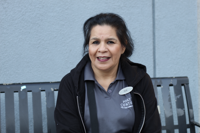
Photo art created by Amairani Herannadez.
Many people were stressed before Election Day, and now post-election, emotions are still running high for some. Here's how to cope with those emotions.
CALÓ News spoke with Octave therapist and licensed clinical social worker Valerie Labanca, who has been in the mental health field for more than 20 years. As a first-generation herself, she understands what the Latino community is going through during these post-election days.
Labanca’s parents immigrated from Uruguay in South America, and she also grew up speaking Spanish as her first language. “In my home, it was kind of like mini Uruguay, and then out in the world, I was exposed to the culture and life here of being in California,” Labanca said.
She also lived for a short period of time during her preschool and kindergarten years in South America, so when she came back to California, she had to learn English and because of that, she got to witness a lot of the challenges of immigration, acculturation and assimilation, and challenges that, on a personal level, happen within a large amount of the Latino community that comes to the United States.
“For a long time, I've been working with a diverse population. I have also worked a lot, specifically with the Latino community. And so I've worked at La Clinica de la Raza and La Casa de las Madres, which primarily worked with either undocumented or uninsured, lower-income Latino populations,” Labanca said.
Currently, many Latinos are grappling with feelings of despair, anger, grief, and fear about the systemic oppressive political practices of conservative parties that will affect the Latino community in the upcoming months. Labanca believes that those feelings are totally valid, as the majority of her sessions over the past week have very much focused on anxiety, fear, grief, and disillusionment that's been happening. “There is a lot of uncertainty; even as a provider, I cannot guarantee what is or is not going to happen. We don't know yet; we have to try to find a way to function.” Labanca said.

Octave therapist and licensed clinical social worker Valerie Labanca.
Consumption of the media
She also discussed how the consumption of media can be really detrimental to everyone's mental health. “It is important to be informed to a degree; social media has actually become not just an information place, but it has become an overstimulating place and an overconsumption of information,” she said.
According to recent Pew Research Center data, around 27% of Latino adults, particularly those between 18 and 49 years old, prefer to get their news primarily through social media, indicating a significant portion of Latinos consume information on social media platforms.
Labanca also said that in addition to consuming information, people are also consuming the emotions of others. Although it is important to be empathetic and validate others, she said that it’s impossible to take care of others' needs when the individual is already feeling pretty down.
Setting limitations & boundaries
To help cope with the post-election emotions, Labanca talked about setting personal boundaries, like avoiding social media altogether. “Boundaries are really healthy. And so there's ways we set boundaries with others, and then we can set boundaries with ourselves. So one is actually setting limits on how much we consume, where we consume it, from how often, and for how long of a period when you are open to wanting to learn stuff,” Labanca said.
“In the Latino community, a lot of times there's this pressure around family and families and the need to be there for your family and whatnot, and the enmeshment and the lack of boundaries, we know that's just not healthy, even outside of the election, that's not necessarily healthy. And so it's important to be able to figure out when you're feeling exhausted or irritated. It's important to look within and be like, "Okay, where can I set a boundary right now that can help protect some of my mental and emotional energy and the little bit that I have?”
Practicing gratitude
She also explained that it’s important to connect with people that individuals might feel safe with or take breaks and go outside—anything that helps improve their mental health. Another tip she suggested was practicing gratitude. “Even amongst all of this, there's things to be grateful for, so each day, people should focus on one or two things that they are grateful for. Whether it's the sun shining, whether somebody made them smile, whether they got to eat a really yummy meal, or they had a connecting moment with another individual.” Labanca said.
Self-care
Labanca stated that self-care is also crucial in moments like these. She also suggested prioritizing sleep, hygiene, getting outside for deep breathing, getting some exercise, and eating well. “All of [that] fundamental and basic self-care [is] even more important in moments when people are feeling just emotionally overwhelmed with a lot of things,” she said. “ I also recommend techniques like square breathing and grounding skills to cope with anxiety.”
Tips for navigating families who voted differently
The 2024 presidential winner, Donald J. Trump, secured 42% of the Latino vote in this year's election. “Many people have a friend or family member who voted differently and in order to approach a difficult conversation, both people have to be at a place where they're actually able to engage in a conversation productively," Labanca said.
She also encourages people to check in with the other individuals before having that conversation to see where they're at and how they are feeling at that moment because they need to be in a place where they are willing to hear someone out through empathetic listening. “Are you willing to try to have a productive conversation? Are you willing to listen to some of my fears and thoughts? Thoughts and concerns, even if they are starkly different from yours. Are you willing to try to learn something different?” she said. “And right now, everything is so new. There are some people who are very happy and they're very much like riding that, and then there are a lot of people who are not. And so because these are two extreme emotions, it might not be the right time to have these conversations in a productive manner.”
Mental health resources post-election
Labanca also reassured that mental health services in California are protected by HIPAA, ensuring confidentiality and encouraging individuals in the Latino community to seek mental health support without fear of their immigration status being revealed.
-Immigrants Rising’s Mental Health Connector
Immigrants Rising provides mental health and wellness resources to help undocumented people stay grounded and thrive regardless of their status. damador@immigrantsrising.org
-988 Suicide & Crisis Lifeline
If you or someone you know is in emotional distress or a suicidal crisis, you can reach the 988 Suicide & Crisis Lifeline by calling or texting 988. You can also chat with the 988 Suicide & Crisis Lifeline here-The National Alliance on Mental Illness HelpLine
For more information about mental health care resources and support, The NAMI HelpLine can be reached Monday through Friday, 10 a.m.–10 p.m. ET, at 1-800-950-NAMI (6264) or email at info@nami.org.
-The Trevor Project
For LGBTQIA+ youth looking for free, confidential crisis support, call 1-866-488-7386, text 'START' to 678-678 or visit their website to chat with a gender-affirming and queer-friendly counselor.











(0) comments
Welcome to the discussion.
Log In
Keep it Clean. Please avoid obscene, vulgar, lewd, racist or sexually-oriented language.
PLEASE TURN OFF YOUR CAPS LOCK.
Don't Threaten. Threats of harming another person will not be tolerated.
Be Truthful. Don't knowingly lie about anyone or anything.
Be Nice. No racism, sexism or any sort of -ism that is degrading to another person.
Be Proactive. Use the 'Report' link on each comment to let us know of abusive posts.
Share with Us. We'd love to hear eyewitness accounts, the history behind an article.